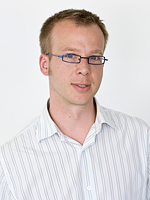
Dr Ingo Ringshausen
Position: Clinical Consultant
Personal home page:
http://www.haem.cam.ac.uk/staff/senior-staff/dr-ingo-ringshausen/
PubMed journal articles - click here
Dr Ingo Ringshausen is pleased to consider applications from prospective PhD students.
We study the interaction between malignant B cells and cells of the microenvironment to understand signalling pathways mediating the generation of tumour supportive niches. These niches are particularly important for microenvironment-mediated drug resistance and contribute to disease relapse and clonal evolution. Results from our studies allow us to target tumour cells by alternative ways than killing the malignant cells themselves and are likely to be more successful due to the lack of genetic instability in the tumour microenvironment.
Symplectic Elements feed provided by Research Information, University of Cambridge
Wagner M, Oelsner M, Moore A, Götte F, Kuhn PH, Haferlach T, Fiegl M, Bogner C, Baxter J, Peschel C, Follows GA, Ringshausen I.: Integration of innate- into adaptive- immune responses in ZAP-70 positive chronic lymphocytic leukaemia. Blood. 2016 Jan 28;127(4):436-48
Lutzny G., Kocher T., Rudelius M., Schmidt-Supprian M., Klein-Hitpass L., Finch A., Dürig J., Haferlach T., Seifert M., Wanninger S., Oostendorp R., Ruland J., Leitges M., Kuhnt T., Wagner M., Feuerstacke Y., Peschel C., Egle A. and Ringshausen I.: Proteinkinase C-beta dependent activation of NF-kappaB in stromal cells is indispensable for the survival of chronic lymphocytic leukemia B-cells in vivo. Cancer Cell, 2013 Jan 14;23(1):77-92
Biberacher V., Decker T., , Oelsner M., Wagner M., Bogner C., Kreitman RJ., Peschel C., Pastan I., Meyer zum Büschenfelde C., Ringshausen I.: The cytotoxicity of anti-CD22 immunotoxin in CLL is enhanced by Bryostatin1 through CD22 up-regulation and PKC-depletion: implications for a sequential therapy. Haematologica, 2012 May;97(5):771-9
Huber S., Oelsner M., Decker T., Meyer zum Büschenfelde C., Wagner M., Lutzny G., Kuhnt T., Schmidt B., Oostendorp R., Peschel C., Ringshausen I.: Sorafenib induces cell death in chronic lymphocytic leukaemia by translational downregulation of Mcl-1. Leukemia, 2011, 25(5):838-47
Ringshausen I., Feuerstacke Y., Krainz P., den Hollander J., Hermann K., Buck A., Peschel C., Meyer zum Büschenfelde C.: Antifungal therapy with itraconazole impairs rituximab´s anti-lymphoma effect by inhibiting CD20 recruitment to lipid rafts. Cancer Research, 2010 Jun 1;70(11):4292-6
Ringshausen, I., C.C. O'Shea, A.J. Finch, L.B. Swigart, and G.I. Evan: Mdm2 is critically and continuously required to suppress lethal p53 activity in vivo. Cancer Cell, 2006. 10(6): p. 501-14
Christophorou, M.A., I. Ringshausen, A.J. Finch, L.B. Swigart, and G.I. Evan: The pathological response to DNA damage does not contribute to p53-mediated tumour suppression. Nature, 2006. 443(7108): p. 214-7















